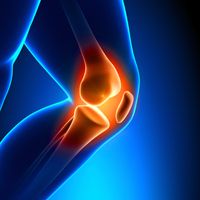Study Will Assess Antidepressant for Treating Knee Osteoarthritis
A New Zealand study announced in Trials will examine whether the antidepressant nortriptyline can safely and effectively treat knee osteoarthritis. The medication is inexpensive and readily available, and it is well-tolerated in patients treated for depression.

A New Zealand study announced in Trials will examine whether the antidepressant nortriptyline can safely and effectively treat knee osteoarthritis (OA). The medication is inexpensive and readily available, and it is well-tolerated in patients treated for depression.
Because knee OA has no known cure, pharmacologic interventions are focused on pain relief and promotion of function. Initial management consists of patient education, exercise and weight loss, but many patients also require analgesics‑‑typically in the form of topical non-steroidal anti-inflammatory drugs (NSAIDs) or opioids.
NSAIDS are well known to reduce pain, but they also significantly increase the risk of gastrointestinal ulceration and bleeding, and are associated with cardiovascular events. Thus, their long-term use is contraindicated in many patients. Opioids, in some studies, have been no more effective than placebo for knee OA patients.
Recent trials of the serotonin and noradrenalin reuptake inhibitors (SNRIs) venlafaxine and duloxetine have shown statistically and clinically significant reductions in pain in patients with OA. But the study of venalfaxine was small and had no control arm, whereas the duloxetine study was associated with significantly more side effects and higher rates of discontinuation than placebo.
The study will be a parallel group, two-arm, participant and investigator-blinded, randomized controlled superiority trial comparing nortriptyline with placebo. Two hundred participants with primary knee OA will be enrolled. Participants will take nortriptyline for 14 weeks. The primary outcome is difference between treatment arms in mean pain score measured on the Western Ontario and McMaster Universities (WOMAC) pain scale at the end of the 14-week treatment duration.
Patients with prior joint joint replacement surgery on the study knee, intra-articular steroid injection within the previous 3 months, known hypersensitivity to nortriptyline, or myocardial infarction within 6 months before study entry will be excluded.
Secondary outcomes will include physical functioning using the WOMAC function subscale, participant-rated global assessment using a visual analogue scale (VAS), and difference in the proportion of participants reporting a treatment effect, defined according to the Osteoarthritis Research Society International (OARSI) set of responder criteria, quality of life, and participant NSAID use during the final 2 weeks of the study period.
“As there is currently a paucity of effective and safe analgesics for this common condition, the results of the study may have widespread clinical and public health implications,” the study authors noted.